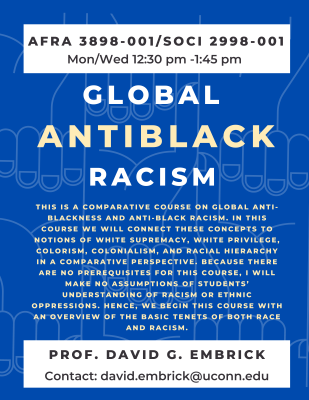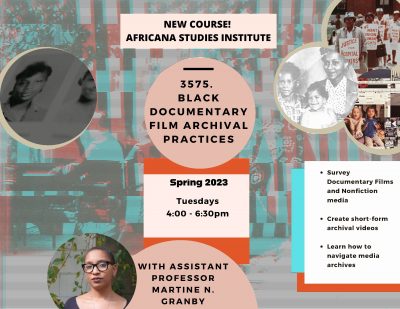
Course Description
AFRA 3898-001/SOCI 2998-001 MW 12:30 pm -1:45 pm
This is a comparative course on global anti-Blackness and anti-Black racism. In this course we will connect these concepts to notions of white supremacy, white privilege, colorism, colonialism, and racial hierarchy in a comparative perspective. Because there are no prerequisites for this course, I will make no assumptions of students’ understanding of racism or ethnic oppressions. Hence, we begin this course with an overview of the basic tenets of both race and racism.
This is a course about how the idea that human beings are racially or ethnically different from one another takes hold in different parts of the world in different ways and with different consequences for those who are considered to be members of subaltern groups. More specifically, this is a course about how anti-blackness is structurally embedded in society and in what ways people of African descent (whether real or perceived) are affected by anti-Black racism.
The course is divided into three parts. We will begin by looking at racism and anti-Black racism, not as an individual set of practices or beliefs that are instilled or inherent in particular people, but rather as a comprehensive historical system of racial domination revolving and organized by the logic of white supremacy. Thus, we will begin the class by looking at several main concepts used by social scientists to analyze anti-Blackness and anti-Black racism. The second part of the course is devoted to understanding how anti-Blackness plays out in different parts of the United States (not typically covered in other courses on race and ethnic relations) as well as within and between different racial and/or ethnic groups. The final part of this course examines racial formations in other parts of our world.

Course Description
AFRA 3575 Tuesday 4:00-6:30 pm
Black Documentary Film Archival Practices is a course that examines how archives are deployed to tell Black diasporic narratives, historical and present-day representations, and the impact of these images. Throughout this course, students will sharpen their understanding of non-fiction aesthetics and modes of production through the construction of short-form archival-based media.
Coursework will provide students with tools to think independently about questions of representation, embedded biases, form, formats, and intended audiences through films, readings, and non-fiction multimedia. Students will further develop the skill to contextualize current events within a historical framework and hone their visual voices. We will interrogate authorship, accountability, and narrative ownership. This course will delve into tensions around access, formal considerations, and ethical usage of pre-existing material from various sources, including public institutions, private collections, stock footage libraries, YouTube, and social media.
For more information, contact Professor Martine Granby: martine.granby@uconn.edu
